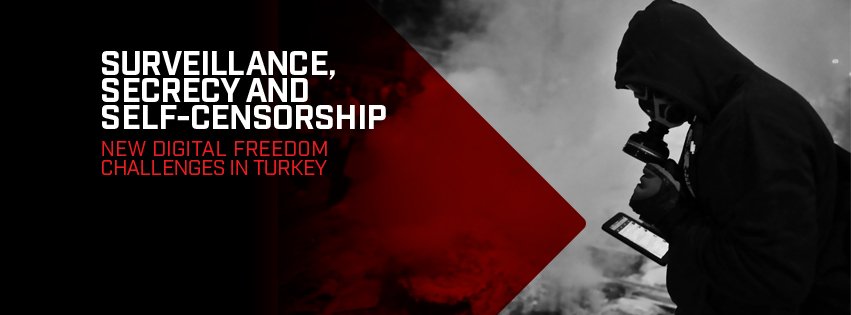Turkey: New Report Highlights Declining Space for Freedom of Expression in the Digital Sphere
‘In Turkey the internet is seen as a place where things can be done independently, and they want to take the internet under control because they fear that.’ – Journalist Yasemin Çongar
LONDON, 16 December 2015 – Freedom of expression in the digital sphere has deteriorated dramatically in Turkey since the Gezi Park protests in March 2013 when peaceful demonstrations organised through social media were harshly repressed, according to a new report released today by PEN International and PEN Norway, the third in a wide-ranging series monitoring and assessing such violations in the country since 2012.
The report – Surveillance, Secrecy and Self-Censorship: New Digital Freedom Challenges in Turkey – documents how Turkish authorities have stepped up their crackdown on freedom of expression online. It highlights the persecution of individual journalists and other writers for their online writing; amendments to laws which have increased the ability of authorities to censor online material; the practice of mass surveillance; and the pressures placed on internet businesses operating in Turkey to censor material or provide information on users to authorities, to name but a few of the challenges.
‘We are gravely concerned about the extraordinary degree of control that Turkish authorities are attempting to exercise over legitimate public discussions online which are well within the interest of the Turkish people. The fact that even as we launch this report one of our colleagues, journalist and PEN Turkey member Can Dündar is behind bars for carrying out his work as a journalist, demonstrates the decline of freedom of freedom of expression,’ said Jennifer Clement, PEN International president.
‘We call on Turkish authorities to respect their obligation to protect the right to freedom of expression online and to release Can Dündar, Erdem Gül and all others imprisoned for their legitimate exercise of fundamental rights.
The report is a frank assessment of the recent regime of online censorship and mass surveillance against a backdrop of longstanding, serious abuses of the judicial process and attacks on freedom of expression by Turkish authorities, taking the form of politically-charged anti-terror and corruption investigations and trials.
‘There isn’t a great deal of mystery around how these legal instruments will be used. The removal of a lot of content is going to be requested; a wall is going to be built in the path of journalism. They have constructed a system of internet regulation that is far from what should be present in a state where the rule of law holds sway; now it’s time for that system to be implemented.’ – Doğan Akın, owner and editor-in-chief of T24.
Blocks on social media and websites, online surveillance and repressive legislation which results in numerous arrests, detentions and trials have become commonplace. According to statistics for 2014 released by the European Court of Human Rights (ECHR), Turkey single-handedly surpassed the 46 other states in the Council of Europe (CoE) in terms of cases involving violations of the right to freedom of expression.
‘The report on digital censorship in Turkey shows a shocking lack of trust from the regime towards its citizens and justifies the deep fear of injustice and suppression being felt in the country’. William Nygaard, President Norwegian PEN.
The net effect of this system of repressive legislation and surveillance is to drive journalists and other writers into self-censorship. As investigative journalist İsmail Saymaz told PEN:
‘Of course [surveillance] has had an impact. For one, people speak on the phone less; they constantly create new email accounts and communicate via them. Until recently, they would engage in behaviour like refraining from keeping CDs around the house or periodically wiping their computers’ hard drives…We eventually got used to living this way. We had to somehow try to continue engaging in journalism regardless.’
The report, based on interviews with Turkish journalists and other writers, supplemented by detailed desk research, concludes with detailed recommendations to the Turkish government, the international community and to internet businesses operating in Turkey, requesting much-needed legislative reform, how to improve transparency and accountability and to ensure that surveillance practices do not violate human rights.
‘Freedom of expression is a fundamental human right not only in international law, but is also the bedrock of democracy. Where this right is denied, all other human rights are at risk.’ – Salil Tripathi, Chair of PEN International’s Writers in Prison Committee.
PEN International and its Centres around the world have been documenting freedom of expression violations and campaigning on behalf of writers in Turkey for several decades. From the 1985 visit of Harold Pinter and Arthur Miller on behalf of PEN International to campaign against the torture of writers and others in prison; to continued calls for investigations into the 2007 murder of Turkish-Armenian editor and PEN member Hrant Dink; to campaigning against the prosecution of writers Orhan Pamuk in 2005 and Elif Shafak in 2006; to the 2012 PEN delegation to Turkey calling for reform of laws stifling Turkey’s writers, publishers, translators, and journalists, PEN’s work continues in Turkey today.
The report is available to read in full here.



